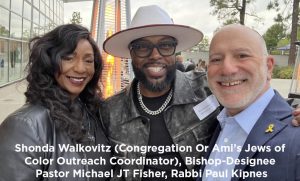|

We sat around tables—
round like the world we wished for,
flat like the matzah we broke,
layered like the stories we shared.
Two seders.
Two sacred nights.
Two vibrant circles of courage and connection.
The first was organized by Zioness,
(unabashedly progressive and unapologetically Zionist),
led by Amanda Berman
Van Jones’ Exodus Initiative
Bishop Designate Michael Fisher
Rabbi Yoshi Zweiback
Featuring the Greater Zion Church gospel choir —
And the second by
Challah and Soul,
created by Shonda Walkovitz
(Congregation Or Ami’s
Jews of Color Outreach Coordinator)
and her partner Judi Leib
Featuring Michael Twitty and Adrian Miller
telling soul food stories —
Both were both evenings
of food, freedom, and fearless truth-telling.
Each seder gathered a constellation of color and courage:
Blacks and Jews,
Black Jews and people of color—
Bishops and Rabbis,
Churches and synagogues,
Choir singing
And the cacophony of connection and contemplation—
We were a veritable mosaic of Moses’ people,
linking arms, lifting hearts,
lamenting and loving in equal measure.
And we talked.
Oh, how we talked.
About the continuous pain
of the Black experience in America—
how racism rolls like a river,
sometimes rushing, sometimes hiding,
but always, always present.
It stains our systems and suffocates souls.
And about antisemitism—
raw, real, resurrected—
no longer just memory,
but a menace,
no longer just history but headlines.
It wears new faces but speaks old lies.
And we talked about Israel—
about the heartbreak, the fear,
and the longing for peace.
We cried for the hostages still in captivity.
We cried for those who grieve,
and those who live in dread.
We spoke of the worries we carry
like water buckets from the Nile—
heavy, ancient, unrelenting.
And of tears—
tears shed both in sorrow,
but also in joy.
The deep sorrow of not being seen.
The deep joy of finding one another again.
We explored what brings us hope.
We sang it, spoke it, savored it.
Hope, as stubborn as spring.
Hope, passed like parsley from plate to plate.
Hovering over it all was Moses,
our model, our messenger, our mirror—
who saw his people’s suffering,
acted, then fled.
Fled and built a world steeped in desert beauty,
buffered from burden,
a life wrapped in comfort and calm.
But when the bush burned—
and did not consume,
Moses noticed.
Moses stopped.
And Moses dared to return
to the wound he tried to forget.
That’s what we did too.
We noticed.
We stopped.
We returned—
to the stories,
to the songs,
to each other.
There was an energy in the room—
electric, expansive, essential.
We came not just to celebrate,
but to congregate—
to connect—
to defy the divisions the world decides to force upon us.
Too many try:
To turn us against one another.
But these nights, we turned to one another.
Too many profit from our pain.
But those nights,
we profited from shared humanity.
Too often we rush through the Seder,
as if it’s only about the Jews.
As if Pharaoh wore only one face.
As if oppression had only one name.
But we know better.
The Exodus is ours,
but not only ours.
It is history and metaphor,
memory and map,
myth and mandate.
Torah commands us—more than 36 times—
to care for the stranger,
for we were strangers in the land of Egypt.
Around those tables,
we strangers became confidants,
then companions,
then community.
We listened.
We leaned in.
We let go.
We became responsible for one another.
Because to see the face of the other
is to see the face of the Divine.
Because to hear the story of the other
is to hear Sinai itself.
These may have been the most inspiring Seders of my life.
Not because of the maror or the matzah.
Not because of the wine or the words.
But because of how wide we opened the table.
Because we broke (unleavened) bread—and built bridges.
Because we refused to pass over pain—
ours or anyone else’s.
Because we remembered:
Freedom is never just for some.
Liberation must always be for all.
And something shifted.
In the telling, in the tasting,
in the listening and the leaning in—
I felt a kind of hope take root.
Not naive, but necessary.
Not shallow, but shared.
Hope that lingers in the crumbs of broken matzah,
and rises in the warmth of unexpected connection.
Friends,
What bridges are you already building? |